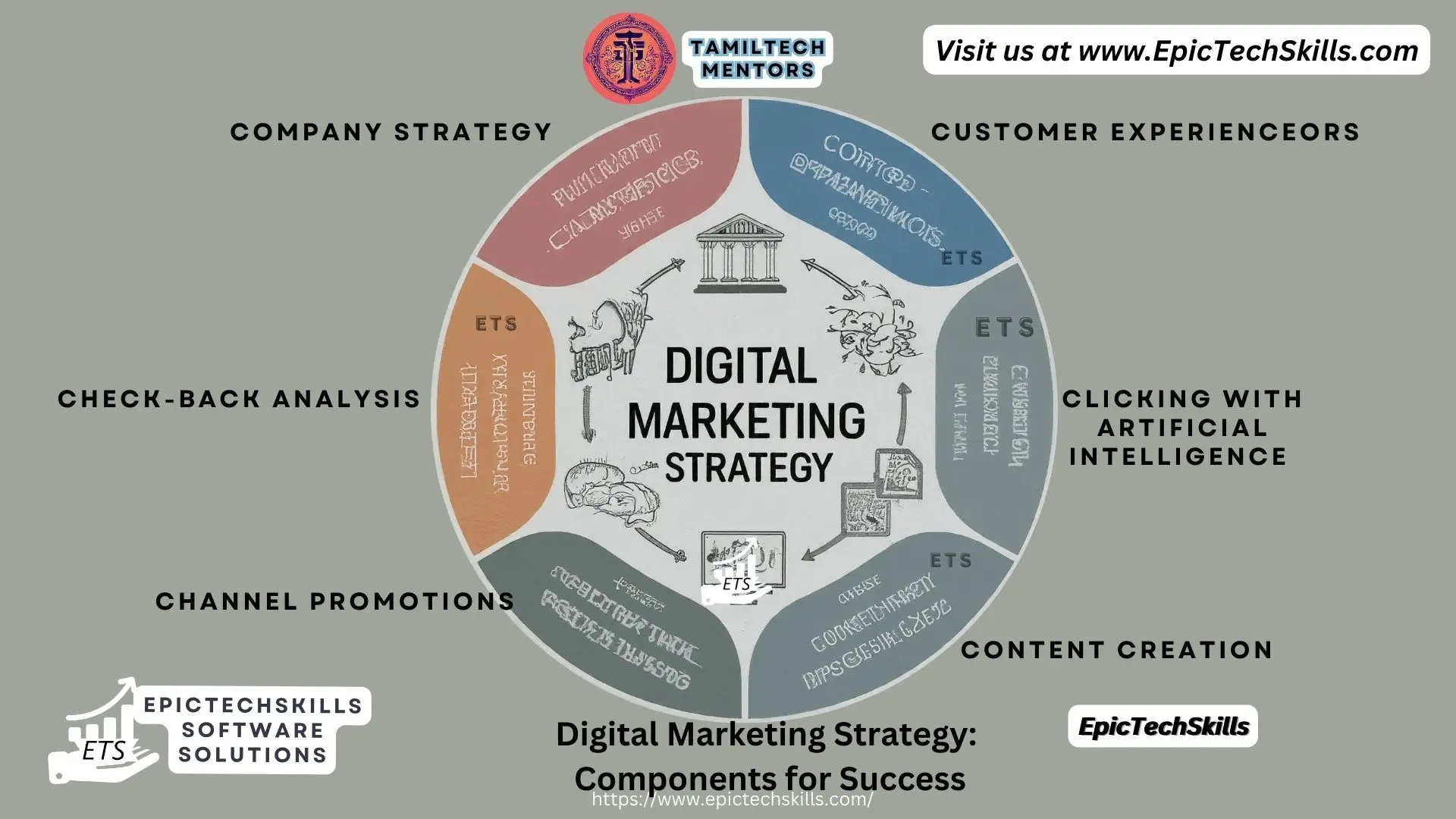Digital Marketing Strategy - Understanding the Components
In today’s world, businesses can’t succeed without the right digital marketing strategy.
But what does that actually mean, and how do you build a winning strategy tailored to fit your company’s goals?
That’s precisely what we’ll be exploring today.
Let’s imagine building your strategy as constructing a house.
You need the proper materials, a strong foundation, and a detailed understanding of what makes it both functional and beautiful. In digital marketing, those components are represented by the “6 Cs”:
- Company Strategy
- Customer Experience
- Clicking with Artificial Intelligence
- Content Creation
- Channel Promotions
- Check-back Analysis
Let’s delve into each of these areas.

I. Company Strategy
Creating a digital marketing strategy:
Think of your company strategy as the blueprint for your digital marketing house. To build a strong house, you need to start with a solid plan, and your company strategy serves as that precise plan.
Here’s what should be included in your strategy:
- Understanding your business model and brand. What makes your company unique? What are your values?
- Getting and keeping your customers’ attention. What do your target customers need and want? How can you attract them and keep them coming back?
- Deciding which marketing campaigns to create. What types of marketing campaigns will most effectively reach your goals?
- Developing the strongest offers – What offers or incentives will be most attractive?
- Planning for B2B campaign success. If you’re in the B2B space, how can you tailor your strategy to reach other businesses?
II. Uncovering the Customer Experience
The customer experience is your potential clients’ entire journey with your company, from that very first glance to loyal repeat purchases. It’s about understanding your customer’s journey at each touchpoint.
- Collect and analyze customer data. Gather as much data as you can about your customers to create the most accurate picture of their needs, wants, and behaviors.
- Create personas. Develop customer personas, which are fictional representations of your ideal customers.
- Develop the buyer’s journey. Map out the different stages of decision-making that customers go through when purchasing.
- Assist with sales enablement. Provide your sales team with the necessary information and tools to close deals effectively.
III. Artificial Intelligence (AI)
AI is transforming the world of digital marketing. Let’s explore some concepts and use cases related to AI and marketing:
- Utilizing AI with advertising: AI can help you target your ads more effectively and personalize them for a greater impact.
- Leveraging chatbots for conversational marketing. AI-powered chatbots can provide 24/7 customer support and answer prospect questions quickly.
- Developing content using AI apps. AI-writing tools can help you generate compelling headlines, blog posts, and even social media copy.
- Deploying personalization. Utilize AI to deliver customer experiences tailored to individual preferences.
IV. Creating Quality Content
Content is the lifeblood of your digital marketing strategy. Think of it as the furniture in your metaphorical house that gives it both functionality and style. It’s what attracts, informs, and ultimately convinces people to become your customers.
- Create a content strategy. What kind of content formats (videos, blogs, infographics, etc.) will be most effective for reaching your audience?
- Develop content types. Diversify your content formats to keep your audience engaged.
- Know what your customers want. Always create content that speaks to your target audience’s pain points and interests.
- Write and storytell. Use the power of storytelling to captivate and connect with your audience.
- Create processes and systems. Establish a workflow for generating quality content consistently.
- Target content for each audience. Know which content appeals to each segment of your customer base.
V. Developing Channel Promotions
VI. Deploying Check-Back Analysis
The “check-back analysis” is like a regular home inspection for your digital marketing house. It’s about regularly reviewing, measuring, and optimizing your work for maximum success.
- Reassess your business model and brand value. Do the results of your marketing align with how you want your company represented?
- Reexamine your content marketing strategy. What content pieces perform the best, and how can you create more of that?
- Measure success. What key metrics matter most to your business goals (website traffic, leads, conversions)?
- Track metrics. Use analytics tools to monitor your progress and make data-driven decisions.
- Optimize campaigns for return on investment (ROI). Adjust your campaigns based on performance for optimal returns.
Conclusion
Building a successful digital marketing strategy is an ongoing process.
It’s a journey of constant learning, adapting, and optimizing your efforts.
By focusing on
- your overall company strategy,
- prioritizing customer experience,
- utilizing AI advancements,
- creating engaging content,
- promoting your brand across varied channels, and
- continually analyzing results,
you can construct the most effective “marketing house” possible.
With this focus, you can reach your target audience and achieve your business goals.
FAQs on the Components of a Digital Marketing Strategy
What are some common digital marketing mistakes to avoid?
- Lack of focus on a target audience,
- Inconsistent branding,
- Not setting clear goals and metrics
How often should I review my digital marketing strategy?
- Review your strategy at least quarterly and make adjustments as needed.
What’s the difference between SEO and SEM?
- SEO (Search Engine Optimization) focuses on organically improving your website’s ranking in search results. SEM (Search Engine Marketing) involves paid advertising to appear at the top of search results.
Is social media marketing really that important?
- Yes! Social media offers a valuable way to connect with your audience, build brand awareness, and drive traffic to your website.
How can I create a more personalized customer experience?
- Use data to segment your audience and tailor your content and offers accordingly. Utilize AI for personalization and automation.